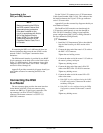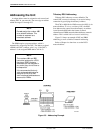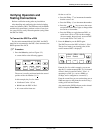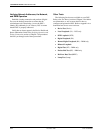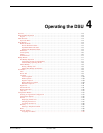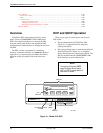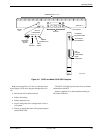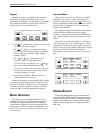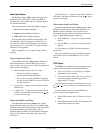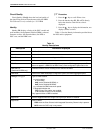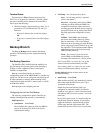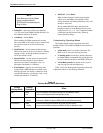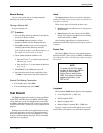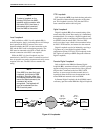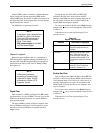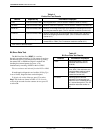
Operating the DSU
4-53615-A2-GB20-20 December 1996
Health and Status
The Health and Status (H/S
) subbranch displays the
health and status of the DSU, as well as the DBM. It
automatically scans for DSU and line conditions that are
not within normal limits.
There are three types of Health and Status messages:
• Devic (Device Health and Status)
• Expan (Expanded Health and Status)
• Subn (Subnetwork Health and Status)
All alarm and status conditions are displayed for the
specified DSU at the time the option is selected.
For a
local DSU
, the alarm and status conditions are updated
every 2 seconds;
for a r
emote DSU
, the alarm and status
conditions are not updated.
Refer to Appendix C for a complete listing of these
messages.
Device Health and Status
Device Health and Status (Devic) reports health and
status information for a selected DSU. If five minutes
elapse without a key being pr
essed
, the Device Health and
Status screen is redisplayed.
• When the digital circuit is the active link,
— The
first line
displays a running
normal-operation timer (hh:mm:ss).
— The
second line
displays the DSU’
s operating
rate and can also display one or more of the test
or alarm messages.
•
An asterisk (
* ) appears at the far right to indicate
NMS activity
.
• A right arrow (→
) appears just before the asterisk
if there is more than one message. Press the key
to see the next message.
Expanded Health and Status
Expanded Health and Status (Expan) only appears
during automatic dialing, and only if an expanded health
and status message has been generated. It retrieves Health
and Status information for the local DSU after an
automatic backup or DTR-controlled backup attempt has
failed, or when there is a disconnect after a successful
connection.
If the right arrow (→) appears to the right of Expanded
H/S
, there is more than one message. Press the
key to
see the next message.
Subnetwork Health and Status
Subnetwork Health and Status (Subn
) displays status
information from a DSU’
s subnetwork (all DSUs and
DBMs assigned to that DSU’
s active poll list). The
downstream network addresses and current statuses are
listed. To page through tributary addresses:
•
Press the
F1 key (↑) for the
next highest
network
address.
•
Press the
F2 key (↓) for the
next lowest
network
address.
No PList appears if no DSUs are being monitored
downstream.
This status information is only available through the
local branch and only when DBM
Diag Type
is set to
NonD.
DTE Status
The DTE
status subbranch provides a snapshot status
of the local or remote unit’s external DTE interface.
•
For the local DSU status
, the display is sampled
and updated every 2 seconds.
•
For the r
emote DSU status, only one set of states is
returned based upon a monitoring period of
approximately 3 seconds.
The DTE interface statuses are displayed in sets. Use
the or
key to scroll each set of lead statuses into
view.
If both a backup connection and the DDS line are
active a selection screen appears first.
•
Select
V.35 to monitor the V.35 interface (for user
data).
•
Select
232 to monitor the EIA-232-D interface (for
router-management or user data).



